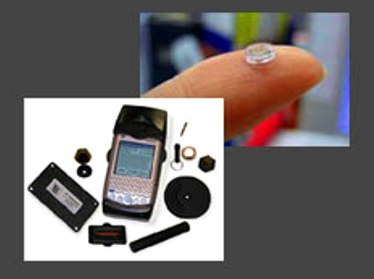ElectriPlast -- RFID, A Blessing or The End Of Privacy

RFID -- To be
Feared???
By Doug
Special to the ElectriPlast Blog
Now this piece is not as controversial as the Steven Colbert diatribe at the Press Club this past week, but it is controversial all the same.
After reading, feel free to share a thought or two.
All right, the disclaimer is out-of-the-way, let’s get to the meat of the subject. RFID (as those reading may know) has its advocates, and its detractors. It all rests in the manner in which these tracking devices are used, and the intentions of those in power who choose to impose them on our daily life. . .
Now, as mentioned in an earlier RFID missive, Integral Technologies, and their ElectriPlast / Plastenna material has great potential to impact this re-emerging market. Built from plastic with the capability to trace and track using the signal enhancing Plastenna technology, RFID’s of the future will only become smaller, more sensitive and possibly—as other technologies emerge—smarter than what is available today.
Is that a good or bad thing???
I’ll let you decide. For now though, recognize only this one fact. ElectriPlast and the associated Plastenna materials care on the ground floor of this re-emergence. With Integral’s IP material, RFID (we’ll call them devices since they can and will soon take on any shape and size) will present a flexible, low-cost solution with regards to the future of asset tracking.
Ok, that said, let’s discuss a bit about “the manner in which these tracking devices are used, and the intentions of those in power who choose to impose them on our daily life.”
RFID is being looked at by some ‘world governments’ as a solution for tracking not only assets, but people too. According to In-Stat, a market research and consulting firm, “The Chinese government is implementing an unprecedented program to give its citizens RFID tags to verify their identities. China bought more than 100 million resident tags in 2005 and is expected to buy about 2.9 billion by 2009.” Consumer Reports, in a recent article, stated that, “Through early 2006, cumulative sales of all radio tags totaled 2.4 billion. But in 2006 alone, analysts forecast sales of 1.3 billion tags. By 2015, they could top a trillion.”
But first, let’s look at the technology:
- RFID uses radio waves to identify an object. It is typically made up of three components: a tag, a reader and a database.
- RFID tags can be either passive or active. Passive tags do not carry a power supply and, when passing close enough to a reader, the reader will energize the tag and extract the data from the tag. An active tag has a power supply and can transmit data up to 750 feet to the reader (as in the case of toll passes). The power may be increased to the point where the data can be transmitted to a satellite.
- Both active and passive tags may be "dumb," without any capability of processing data on board or "smart," having significant storage capacity that can support possible data security measures such as encryption, or including sensors for measuring conditions such as pressure or heat.
 But a new technology brings new questions:
But a new technology brings new questions:
Will a persons rights be violated?
Will this new technology match product information to an individual’s Personally Identifiable Information (PII) such as a person’s location or his buying habits?
In 1999, it was inconceivable that everything would have a tag attached or implanted because each tag was too expensive – more than $1. But, it is estimated that in the near future, each tag will cost less than a penny.
In 2003 the Defense Department and Wal-Mart began demanding that suppliers use RFID tags on all crates and cartons. By 2007, the government will mandate that anyone applying for or renewing a U.S. passport will be issued an e-passport with an RFID chip in the back cover. Initially, it will only contain a digital photo and the other information contained on a paper passport. But they are leaving room for fingerprints and an iris identification pattern.
Can identity thieves and crooks hack into RFID tags? Experts say, “Yes!”
A John Hopkins University team invented a device that could transfer the data from an Exxon/Mobil SpeedPass tag to a laptop. Disguised in a knapsack, the device passed close to a SpeedPass user filling up with gas. They then drove to another gas station and filled up with gas charging the SpeedPass holder’s account… all within 30 minutes.
Another team invented a machine that could extract all the data from an implanted tag. “If you simply pass close to someone who has one of these tags implanted, you can copy the chip and replay the ID number to any reader, allowing you to assume that person’s identity.” Former Gov. Tommy Thompson was one of the first high-profile supporters of tiny microchips implanted in people's arms that would allow doctors to access medical information.
Former Gov. Tommy Thompson was one of the first high-profile supporters of tiny microchips implanted in people's arms that would allow doctors to access medical information.
Now the state he used to lead is poised to become the first to ban governments and private businesses from forcing such implants on employees, privacy advocates say.
A proposal moving through the state Legislature would prohibit anyone from requiring people to have the tiny chips embedded in them or doing so without their knowledge. Violators would face fines of up to $10,000.
The plan authored by Rep. Marlin Schneider, D-Wisconsin Rapids, won approval in the Assembly in March. The state Senate on Tuesday is scheduled to consider the measure, which would allow for the implants if the person gives consent.
Gov. Jim Doyle would sign the bill, a spokesman said.
Schneider aides say the legislator wants the law in place before companies and governments could use them to keep track of their employees.
"I don't think most people had thought about this as an issue, but it's scary. It's reality now," said Michael Schoenfield, an aide to Schneider. "Companies can or will be ordering their employees to have chips implanted. We want to stop that before it begins."
VeriChip Corp. of Delray Beach, Fla., is the only company with federal approval to implant such chips in people. The company so far has implanted 2,500 people worldwide with chips the size of a grain of rice under the skin of their upper arms, said spokesman John O. Procter.
Thompson endorsed this application last year as a way to give hospitals easy access to patients' medical records when he joined VeriChip's board of directors and vowed to "get chipped" himself.
Procter said Monday that Thompson has not undergone the procedure, which he likened to getting a shot, but plans to do so once more hospitals adopt the technology. The chips give off a radio frequency signal identifying a patient. The signal is used to access personal information in an Internet database.
VeriChip is also marketing the implants as a way for companies or governments to limit access to high-security areas.
In February, a Cincinnati surveillance equipment company became the first U.S. business to use this application when a handful of employees voluntarily got implants to allow them to enter secure rooms. Some employees in the Mexico attorney general's office have also been implanted with chips, whose signals are recognized by readers in doorways.
Procter said VeriChip supports the spirit of Schneider's bill and would not work with companies forcing employees to get implants. However, he said the implants are superior to employee badges or key chains as a way to limit access.
"It's more secure. It's discreet and it can't be lost or stolen," he said.
Privacy advocates say they are unaware of any companies forcing implants but are worried the technology is taking off with little debate about potential abuses.
Wisconsin would be the first state to ban mandatory implants, said Katherine Albrecht, a New Hampshire privacy advocate and co-author of "Spychips: How Major Corporations and Government Plan to Track Your Every Move with RFID."
Albrecht said she recently handed Thompson a copy of her book when he was in New Hampshire giving a speech.
"What an interesting irony that the foremost chip promoter in the world comes from Wisconsin and Wisconsin would be the first state to say, 'Hey, at least get our permission first'," Albrecht said. "It's good that lawmakers in Wisconsin are paying attention to the fact that this technology even exists."
The proposal would leave the door open for the state to order implants to track sex offenders or for parents to track their children under an amendment offered by Rep. Scott Suder, R-Abbotsford. Such applications are years away because the chips do not yet allow for surveillance tracking.
"The bill may be a little ahead of its time but I think it prevents some very onerous activity," Suder said. "It is groundbreaking."
Reference Material:
Chinese government enacts unprecedented ID tag program
GovExec.com DAILY BRIEFING April 24, 2006 -- By Chris Strohm, National Journal's Technology Daily
Associated Press (AP) April 25, 2006 -- By Ryan J. Foley, St. Paul Pioneer Press








0 Comments:
Post a Comment
<< Home